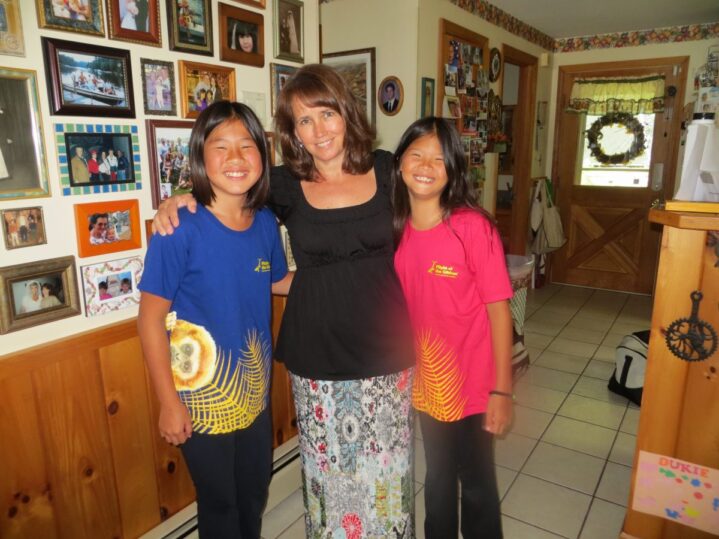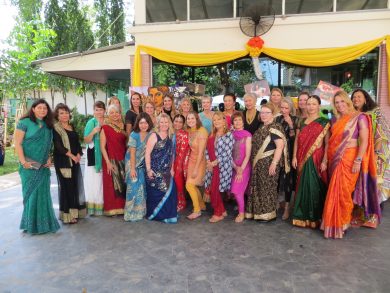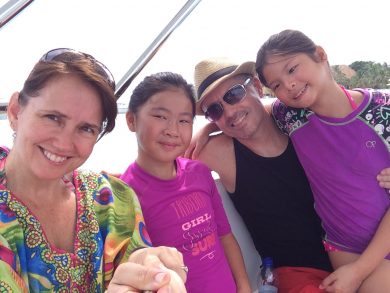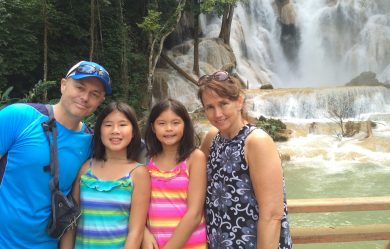
Learning to thrive in a home away from home
Lauri Barrett talks about her new role as President of AWC Thailand, the laborious process of international adoption, and making the most of new experiences.
The contenders for best picture at the Oscars this year contrast wildly in genre, pace and plot. Amy Adams puts in a star turn using her beautiful mind to negotiate an independence day with the aliens in Arrival. In Hacksaw Ridge, Mel Gibson does what he does best producing a flag waving, patriotic, schmaltz-fest that concludes in exhausting, nonstop machine gun action. And you can (literally) see Ryan Gosling count his steps as he keeps dancing pace with the angelic Emma Stone in La La Land.
As the lights fire up the night sky over Tinsletown, and the winners’ names are plucked from gilded envelopes, it will be breakfast time 8,000 miles away in Bangkok … but no less boozy. The American Women’s Club (AWC) hosts its annual Breakfast at the Oscars, a charity event where t-shirts, tiaras, Thai pants and bottles of Prosecco feature prominently.
Making it happen
Over the last few weeks, Lauri Barrett and her colleagues have toiled over the event logistics and planned a morning of fundraising activities around the occasion. The proceeds will be donated to programmes supporting communities whose lives are a far cry from the glitz and glamour of the show business world.
Managing international member clubs and events like this one can be challenging due to the transient nature and diverse commitments of their members. When a colleague leaves, the committee role needs to be re-delegated. This creates an environment where everyone mucks in, contributing skills where they can based on their natural attributes and experience.

Lauri, a mother of two, moved to Bangkok two years ago and was initially only interested in club in a social capacity. However, with over 20 years’ experience of marketing and finance in corporate America, she found herself putting her hand up to offer help. As time passed, she became increasingly woven into the fabric of the club, progressing through the positions of treasurer, fundraiser, VP and, most recently, AWC president.
The rigours of international adoption
Lauri and her husband, Lincoln, first became entrenched in the international community when they moved to Shanghai five-and-a-half years ago for his work. Since then, they have met a number of likeminded families who have endured the stringent process of international adoption. “Perhaps it’s the nature of the families who are willing to up roots and relocate their lives abroad”, she ponders. “If anyone wants to adopt, then they must really want children, because it’s a lot more paperwork and hassle than pro-creating yourself”.
The Barrett’s first submitted their application with a US based agency while living and working in the States in 2009. The entire procedure is an invasive sequence of scrutiny involving background checks, home visits, personal references and mountains of paperwork. They turn your lives inside out, requiring clearance from the local police in every location you ever lived; at home and abroad.
A local agency in Taiwan worked to find a match for the prospective parents based on their profile and requested age range: six months to two years. As the months and years ebbed away, it became apparent that they would need to increase the age range to stand a better chance of a match. After three-and-a-half years, shortly before their move to China, the Barrett’s adopted their first daughter, Kiera, aged five.
As Lauri recounts the delays and archetypal frustrations, her pragmatic sensibilities shine through. It is clear that she and her husband maintained a realistic outlook during the process. So once settled in Shanghai, they submitted the paperwork with the same agency to start the process again for a second child.

Recalibrating the family
Both girls were aged seven when Reagan arrived to complete the family of four. “It’s a big impact on them. You have to recalibrate as a family. You never know how they’re going to accept the new one. But Kiera was amazing”, Lauri proclaims.
It seems obvious, but there is no instruction manual for new adoptive parents, and very little advice from the agencies going forward. Further compounding this were the language difficulties. Neither girl spoke English at first. But Lauri says, “You find ways to communicate. We watched a lot of Barbie movies and did crafts together.”
Making life work for you
That flexibility and resolve are important characteristics for any internationalist who relocates to a new country, especially those with little knowledge of the native language. When I suggest to Lauri it’s about finding a way to survive, she corrects me. “It’s about learning to thrive. If one thing works for you in one place, you may have to figure out an alternative in the next. It’s the people who can refocus themselves who have a great time.”
With a school age child, Lauri got busy in Shanghai with the school and the USA Girl Scouts Overseas programme. She utilised her management skills to give back to the Chinese and international communities. “For me, it helps to give personal value to my efforts while living abroad when I don’t earn a pay cheque”, Lauri says.
The responsibilities she had accumulated after three years of living in China, say a lot about the American’s work ethic. She led a troop of 32 kids from the school, worked as treasurer for the city wide Girl Scout organisation, and led the planning of inter-club events at the city wide level. But that all changed within an instance.
“I was up to my neck in Girl Scout stuff. I didn’t know I was leaving” Lauri reveals. “I got a call from Lincoln in the middle of the day who said: ‘Hun, how do you feel about living in Bangkok?’” She returned to her meeting, paused for a moment and then announced to her colleagues, “Erm … I’m moving to Thailand.”

Business as usual?
As we near the end of the conversation, I ask Lauri about her ambitions for the club. She instinctively replies: “It’s never business as usual. It’s a changing environment depending on who’s participating in the club and their availability.”
The new president hopes to make the club more inclusive and easier for its members to get involved in the committee and organising activities. This includes making the club house a more welcoming environment. Lauri has already had one notable success. Last year, as VP, she suggested knocking a wall down to open up the space in the lounge area. Once finished, it created the perfect, convivial atmosphere for social coffee mornings.
Lauri also hopes the club will repeat the success of last September’s Run for Dek Thai in Lumpini Park, which attracted well over three thousand runners. The unique thing about the sponsored run is the increased interaction between the international and Thai communities, meeting in the park, and dispelling myths about expats working in Thailand simply ‘living the high life’. Most importantly, it helps to increase awareness of the fundraising activities of women’s clubs in general.
AWC’s principle charity project is their Scholarship Programme. The club raises funds and solicits scholarship support from individuals for Thai girls in rural Thailand. To find out more, <click here>



